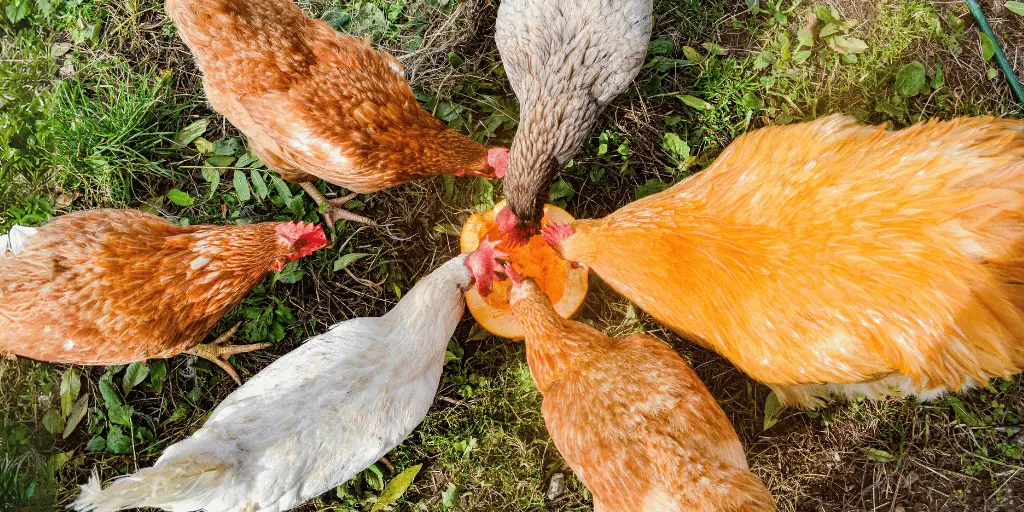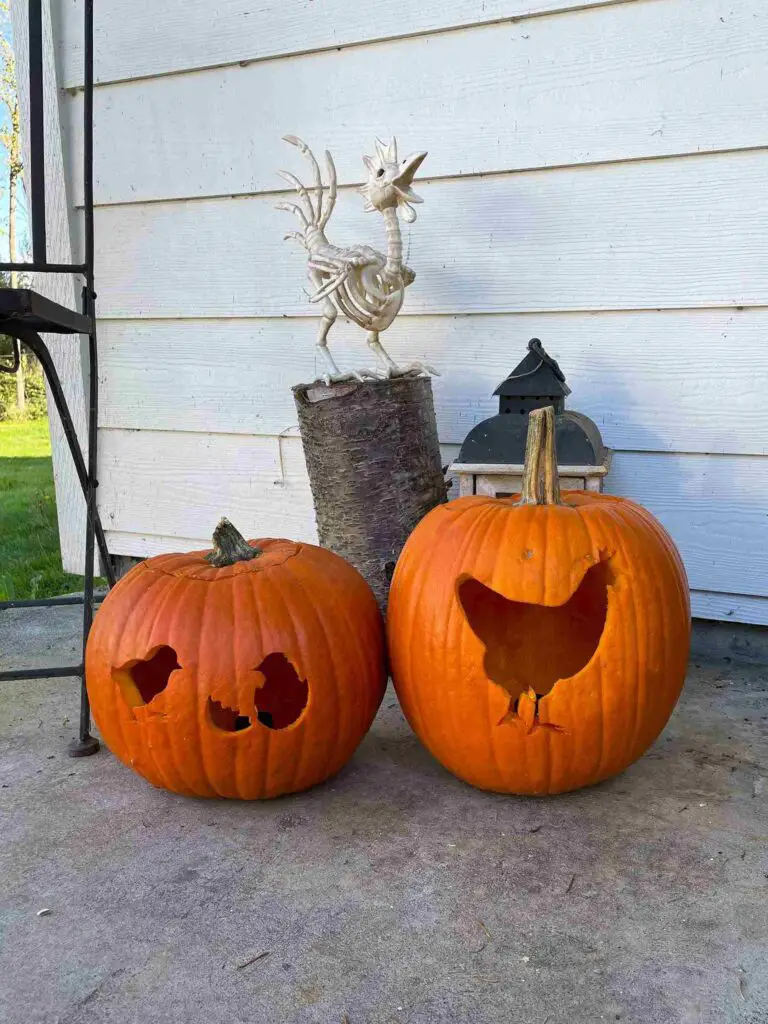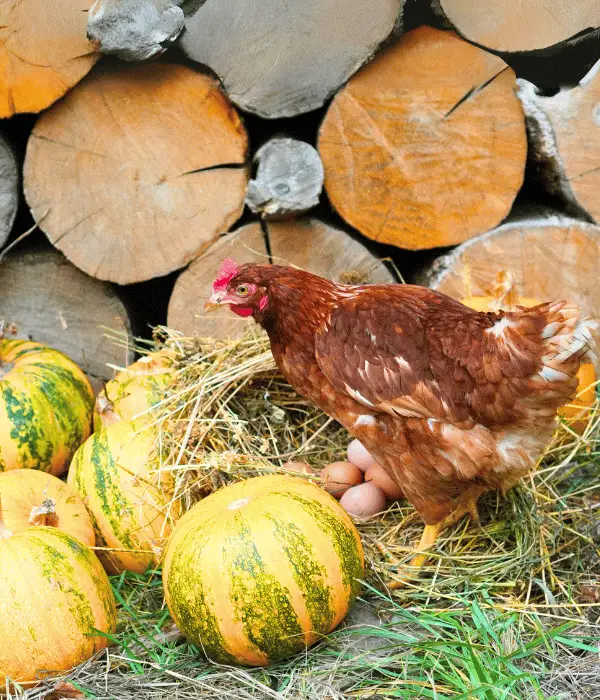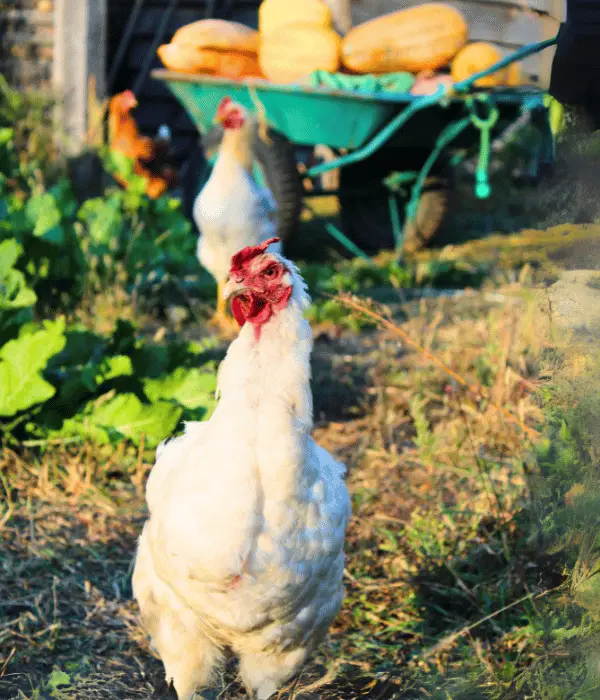
Have you ever wondered, “Can chickens eat pumpkin seeds?” As a backyard chicken owner or a poultry farmer, you may want to find different treats for your chickens.
As pumpkin seeds are easy and low-cost to get everywhere, you may want to feed your chickens.
But is it safe to feed pumpkin and its seeds to chickens? In this guide, we will explore all about it.
The answer is yes, chickens can eat pumpkin seeds, but as with everything, moderation is key.
You might have many pumpkins, especially after Halloween, or you might have just carved a chicken jack-o-lantern and wondered what to do with all the insides.

Don’t worry; after reading this, you will get your answer.
Chickens like pumpkins as treats, especially the seeds. However, there should be other food sources for your flock.
Before you give the pumpkin and its seeds to your chickens, you must know about chicken food and nutrition. This will make sure you give them a balanced diet.
It’s also crucial to be aware of potential risks, such as moldy pumpkins, which could harm your birds.
Understanding Chicken Diet and Nutrition
A chicken eats plenty of different things. The diet comprises grains, fruits, vegetables, and insects, which provide proteins, vitamins, and minerals.
If you’re wondering, “Do chickens eat pumpkin seeds,” the answer is yes.
But you should know that pumpkin seeds can be a good source of nutrients, but they shouldn’t be a significant part of their diet.
Poultry nutrition is a complex issue. A balanced diet is essential for chickens to maintain their health and productivity, whether you are raising meat or laying eggs.
Chickens need different nutrients throughout their lives, so changing their diet is essential.
Adding pumpkin seeds to your chicken’s diet can be beneficial, but they should not replace other essential foods. High-quality poultry should be the primary diet of chickens.
Feeding a good mix of protein, carbs, and essential vitamins and minerals is best for chickens.
Also read: 17 Best Greens For Chickens To Feed
Nutritional Benefits of Pumpkin Seeds for Chickens
Pumpkin seeds, or pepitas, are packed with protein, vitamins, and minerals that can benefit your chickens.
They are a good source of protein, which is vital for making eggs and building muscles. These seeds also contain fiber, which aids in the digestion process.
Furthermore, pumpkin seeds are loaded with essential fatty acids, which enhance the well-being and appearance of your chicken’s feathers.
They also contain antioxidants, which help strengthen the immune system and protect your chickens from diseases.
One of the most significant benefits of pumpkin seeds for chickens is their natural deworming properties.
They contain cucurbitacin, toxic to many parasites and worms that might infest your chicken’s digestive system.
Feeding your chickens pumpkin seeds can help keep their guts healthy and worm-free.
How to Feed Pumpkin Seeds to Chickens?

There are several ways to feed pumpkin seeds to your chickens. One option is to scatter the seeds on the ground and allow the chickens to peck at them.
This method provides the chickens with a tasty treat and presents them with a fun challenge as they try to crack open the shells to access the nutritious seed inside.
Another approach is to grind the pumpkin seeds and mix them into the chickens’ regular feed.
By doing this, you ensure that all the chickens in your flock have an equal opportunity to enjoy the benefits of the seeds, particularly if you have many chickens to feed.
However, it’s important to remember that pumpkin seeds should only be given to chickens as a treat or supplement to their regular diet.
They should be the only primary feed for chickens. Ensure your chickens have a balanced and nutritious diet for their health and well-being.
The Dangers of Moldy Pumpkins and Squash Seeds for Chickens
While pumpkins and their seeds can be an excellent treat for your chickens, it’s crucial to be cautious.
Pumpkin and squash seeds that are moldy can be harmful to your flock.
The mold can make mycotoxins, which can cause serious health problems in chickens, such as reduced egg production, poor growth, and even death in severe cases.
Look at it carefully when carving a chicken jack-o-lantern or feeding the pumpkin to your chickens.
If you notice any signs of mold, such as a musty smell or fuzzy growth, immediately discard the pumpkin from your chicken coop area.
It’s important to remember that moldy pumpkin seeds shouldn’t be given to your chickens. Moreover, throwing the seeds away is better if they smell moldy or discolored.
Raw Pumpkin vs. Cooked Pumpkin for Chickens
Many poultry owners debate whether to feed their chickens raw or cooked pumpkins. The truth is both are safe for chickens to consume but have advantages.
Raw pumpkin, including the pulp, seeds, and skin, can be an excellent treat for chickens.
They enjoy the challenge of pecking through the tough skin to get to the seeds and flesh inside. Additionally, raw pumpkin seeds have a deworming effect.
On the other hand, cooked pumpkin is easier for chickens to consume and digest. Cooking softens the tough fibers in the pumpkin, making it easier for the chickens to peck and scratch.
However, cooking can reduce some nutritional content of the pumpkin. But it is good if you have some pullets and cockerels because they will love the soft ones.
Also read: Chicken Scratch Feed: All You Need To Know Before Feeding
Other Pumpkin Parts Chickens Can Eat

Aside from the seeds, chickens can eat practically every pumpkin part. They can eat the flesh, skin, and even the stringy pumpkin guts you scoop out when carving a pumpkin.
The pumpkin flesh is rich in vitamins A and C, which benefit the chickens’ immune system and eye health.
The skin, although challenging, can be pecked at by the chickens and provides additional fiber.
Many flocks like the stringy guts, which contain most of the seeds.
Too much of a good thing can be harmful, which is the case with pumpkins. That’s why remember to feed these parts to your chickens in moderation.
Do Chickens Eat Other Types of Squash Seeds?
If you’re curious about whether chickens have a taste for other varieties of squash seeds, you’ll be pleased to know that they indeed do.
Chickens can consume seeds from various types of squash, such as butternut squash, acorn squash, and spaghetti squash.
Similar to pumpkin seeds, squash seeds are packed with essential nutrients and possess deworming properties that can benefit the chickens’ overall health.
However, it’s important to note that these seeds should be provided in moderation, not wholly replacing the chickens’ regular diet.
Also read: Sunflower Seeds to Chickens: Benefits, Nutrition, and Safety Tips
The Importance of a Balanced Diet: Chickens and Pumpkins
Pumpkins and pumpkin seeds can be beneficial additions to your chicken’s diet, but they should not be the primary food source. A balanced diet is significant for chickens to stay healthy and productive.
A balanced chicken diet mainly consists of commercial poultry feed specially made to meet the nutritional needs of chickens. It has the right amount of proteins, carbohydrates, vitamins, and minerals.
Pumpkins and their seeds should be considered treats or supplements. They can provide additional nutrients and variety to your chickens’ diet but should not replace the essential foods.
White Pumpkins, Pumpkin Seeds Whole, and Other Varieties: Which is Best For Chickens?
You may be wondering which pumpkin or pumpkin seed is best for chickens. Chickens can consume white, orange, and small pumpkins.
Pumpkins are an excellent treat for chickens, whether you have plenty from your fall harvest or want to feed them a healthy diet.
Chickens can eat whole or ground pumpkin seeds of different colors. Chickens love to peck open entire pumpkin seeds and eat the delectable insides.
Grounded seeds can be readily put into their daily meal to provide all the nutritional benefits without difficulty.
So treat your white, orange, and small garden pumpkins to your chickens without worrying about the color.
Can Chickens Have Too Much Pumpkin?
Yes, it is essential to note that chickens can indeed have an excessive amount of pumpkin.
Although pumpkins are generally considered a nutritious food source, limiting them to a level is crucial. Excessive consumption may cause indigestion but in rare cases.
Pumpkins are high in water and fiber, but they do not have the proteins, fats, or vitamins chickens need to stay healthy.
We can, it’s a one-flavor salad for them. Therefore, overfeeding chickens with plenty of pumpkins can result in them becoming picky eaters.
This can lead to a situation where they prefer pumpkin over their regular feed, ultimately causing nutritional deficiencies.
So, it is essential to exercise moderation when incorporating pumpkin into a chicken’s diet.
Other Foods You Can Feed Your Chickens
To provide your chickens with a balanced diet, you can feed them many items besides pumpkins and pumpkin seeds.
In addition to their regular diet, feeding children various fruits can be nutritious and fun.
Fruits like apples, berries, and melons give vitamins and minerals. Additionally, eating vegetables is healthy.
Carrots, peas, and leafy greens are healthy options. Corn, wheat, and oats are great carbohydrate sources for energy.
You can also feed them kitchen scraps, but avoid salty, spicy, or moldy foods as they might be dangerous.
Also read: 30 Best Chicken Coop Decor Ideas (For Inside & Outside House)
Conclusion: (Can Chickens Eat Pumpkin Seeds?)
In conclusion, the answer to the question, “Can chickens eat pumpkin seeds?” is a resounding yes.
Pumpkin seeds can be a nutritious treat for your chickens, providing them with essential nutrients and natural deworming properties.
However, remember that pumpkin seeds and other treats and supplements should be fed in moderation.
Your chickens should eat a good and balanced food that is good for them as their primary food.
So, the next time you have a giant pumpkin in your garden, don’t hesitate to give it to your chickens. Whether the pumpkin is green, orange, white, or smaller, your chickens will love it.
Remember, your chickens’ health and happiness depend significantly on the care and nutrition you provide.
This guide helped you get all your answers about feeding pumpkins to chickens. Happy Feeding.


Leave a Reply